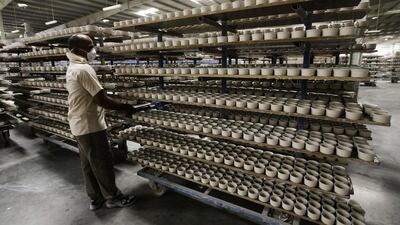RAK Ceramics posted a 10.2 per cent rise in net profit last year on the back of a value-creation plan introduced by the majority owner, Samena Capital, in mid-2014.
Profit rose to Dh310.3 million last year from Dh281.7m in the previous year. Samena owns a 30.6 per cent stake in the Abu Dhabi-listed company.
The group said that gross margins increased by 2.3 per cent to 28.2 per cent as a result of its focus on a “core business” of tiles, sanitary ware, faucets and tableware in the GCC, India and Bangladesh, but also through “substantial” gains made from the sale of non-core businesses.
However, overall revenue fell by 1.5 per cent to Dh3.1 billion and revenue in the “core” business was 2.9 per cent lower at Dh2.59bn, thanks largely to an 8 per cent drop in tile sales.
Abdallah Massaad, the chief executive of RAK Ceramics, blamed the decline on currency fluctuations, adding that on a constant currency basis overall sales were up by 1.5 per cent.
He also pointed to an 85 per cent increase in capital expenditure in the core business. “We spent, in core, Dh257m, which was almost double the average of the last five years,” he said.
This has gone on increasing production capacity – by 42 per cent for tiles and 25 per cent for sanitary ware in Bangladesh, and by 22 per cent for sanitary ware in the UAE. He also pointed to the buyout of minority investors in Iran and India, and of joint venture partners in two of its three European distribution centres in the UK and Germany.
The performance of the non-core businesses dramatically improved following the closure of a Sudanese arm that had been a victim of hyperinflation and a Chinese division that had suffered heavy losses. A range of other businesses were sold, including companies involved in pharmaceuticals, paints, textiles and building materials.
Mr Massaad said that it had turned around the fortunes of two contracting companies – the 1,000-strong Al Hamra Construction and the 300-person MEP firm Electro Group, and said that it will consider offers for them.
“When a business is profitable, it has a different value.”
Mr Massaad said that after increasing capacity, he remained confident of RAK Ceramics’ ability to grow market share.
“We are aware of the economic and geopolitical factors that will continue to challenge our business in 2016 and may impact our performance but we are confident that we have the right mechanisms and measures in place to mitigate those risks.”
Anoop Fernandes, a senior analyst at Bahrain-based Securities and Investment Company, welcomed the disposal of non-core assets and said the core business “has done fairly well”, despite the fact that a depreciated euro and a devalued yuan had made competitors’ products cheaper.
“Even Indian producers have become more competitive. The rupee has fallen and the cost of production in India has gone down. You see a lot of exports from India coming into Saudi and the UAE as well. So market conditions are not very suitable but they have done a decent job.”
RAK Ceramics increased its cash dividend to 30 per cent per share from 25 per cent in 2014 and is paying out a further 5 per cent in stock. Its shares closed 9 per cent higher on the Abu Dhabi Securities Exchange at Dh3.30.
mfahy@thenational.ae
Follow The National's Business section on Twitter


